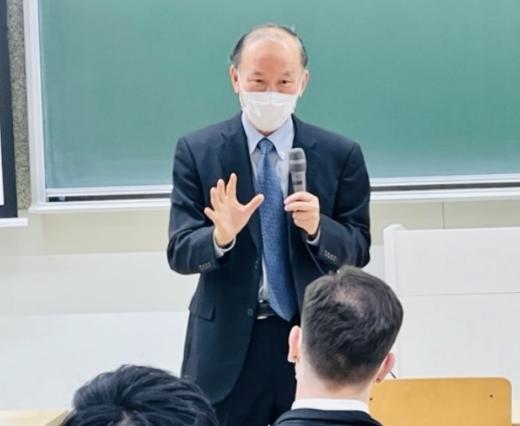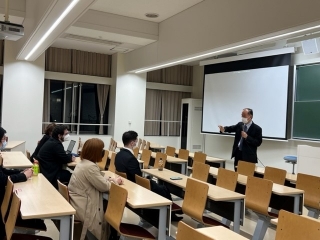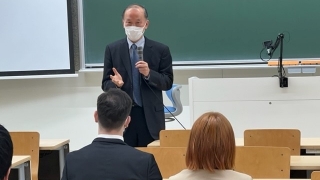Lecture by Soichiro Seki (President of Japan Industrial Waste Information Center, Former Vice Minister MOE)
- Academics
- Graduate Schools
- The Graduate School of Economics:
- International Business Studies Program
- IBSP TOPICS
- Lecture by Soichiro Seki (President of Japan Industrial Waste Information Center, Former Vice Minister MOE)

2022/12/21 11:00
Lecture by Soichiro Seki (President of Japan Industrial Waste Information Center, Former Vice Minister MOE)
Seminar by Soichiro Seki (President of Japan Industrial Waste Information Center, Former Vice Minister MOE) on 14 December 2022
Having worked for the Ministry of Environment for 38 years, the speaker comes to Soka University with a wealth of experience in his field.
The speaker began with a short biopic introduction of his engineering background. He was part of the team that managed the Great East Japan Earthquake occurrence. President Seki played a role in mitigating the disaster.
One of the highlights of his career is working for JICA in Thailand. He has also worked for World Bank (WB) for three years and managed expressway construction projects in China. The speaker began with a survey and chronological history of contemporary environmental developments, dividing it into the 1950s to 1980s (the fight against pollution, especially industrial pollution); the 1980s to 2000s (Harmonizing Environmental development), and from the 2000s onwards, issues of climate change.
Having worked for the Ministry of Environment for 38 years, the speaker comes to Soka University with a wealth of experience in his field.
The speaker began with a short biopic introduction of his engineering background. He was part of the team that managed the Great East Japan Earthquake occurrence. President Seki played a role in mitigating the disaster.
One of the highlights of his career is working for JICA in Thailand. He has also worked for World Bank (WB) for three years and managed expressway construction projects in China. The speaker began with a survey and chronological history of contemporary environmental developments, dividing it into the 1950s to 1980s (the fight against pollution, especially industrial pollution); the 1980s to 2000s (Harmonizing Environmental development), and from the 2000s onwards, issues of climate change.

The milestones in global environmentalism are also discussed against this context and background. The speaker indicated that we are entering the end of the age of fossil fuels (the by-products like plastics/microplastics which led to climate change).
The early history of fast economic growth (the era of the income-doubling plan) was also covered in the presentation, including the Minamata incident (mercury poisoning due to the industrial by-product of mercury). Quantitative data from the PMO (Prime Minister's Office of Japan) from this period was shared with the audience. Besides the Minamata Disease incident, the speaker also mentioned other industrial diseases like Yokkaichi Asthma and Itai-Itai diseases invoked by fast growth during the incoming doubling period of the 1960s.
The early history of fast economic growth (the era of the income-doubling plan) was also covered in the presentation, including the Minamata incident (mercury poisoning due to the industrial by-product of mercury). Quantitative data from the PMO (Prime Minister's Office of Japan) from this period was shared with the audience. Besides the Minamata Disease incident, the speaker also mentioned other industrial diseases like Yokkaichi Asthma and Itai-Itai diseases invoked by fast growth during the incoming doubling period of the 1960s.
The remarkable clean-up of the Kyushu industrial zone was also shared with the audience members. The visuals were helpful in understanding the presentation materials. The factors that led to Japan's dramatic environmental transformation, including the use of policies, laws, and regulations, were also shared with the audience members.
Fast forwarding to today's period, climate change and temperature increase as well as other contemporary challenges were shared with the audience members. Challenges specific to Japan were shared, like extreme precipitation in Japan, bursting of sewage pipes, floods, changes in rainfall patterns, etc.
In other countries, other challenges arose eg. drying wetlands in Iran. President Seki then shared with the audience a slew of blueprints, policies, and declarations by Japan in tackling the future of climate change.
The most important directional change, according to the speaker, was that environmental measures are no longer constraints on economic growth, and managing carbon neutrality has become an important priority for Japan (aiming to be net zero by 2050). In this sense, the move towards a new energy system based on renewables is inevitable. The future trend of evaluating investments based on sustainability and ethical factors within the context of ESG investments (including compliance with the International Sustainability Standards Boards benchmarks like disclosure standards and the issuance of green bonds) is also well-detailed in the speech. In this context, combining automobile connectivity, autonomous vehicles, shared transport services, and electric vehicles in a comprehensive manner is a top priority for Japan.
This lecture gave very good opportunities for the students to learn about the field.
The appeal of his lecture to the students lies in 3 points. First, it touches on a very timely topic that concerns all of us as global citizens. Climate change is something that impacts every country represented in the audience members consisting of students from Malaysia, Indonesia, Brazil, Japan, Korea, and France. Second, the students were able to tap into the practitioner’s knowledge of a former bureaucrat, developmental experts on the ground, and non-governmental organizations’ management. Applied knowledge and applied learning are very important to today’s world. And finally, the speaker’s multidisciplinary lens was very important for the audience members who were keen to look at complex problems today from different angles and viewpoints. Certainly, the exchanges in the Question and Answer session reflected this enthusiasm.
The appeal of his lecture to the students lies in 3 points. First, it touches on a very timely topic that concerns all of us as global citizens. Climate change is something that impacts every country represented in the audience members consisting of students from Malaysia, Indonesia, Brazil, Japan, Korea, and France. Second, the students were able to tap into the practitioner’s knowledge of a former bureaucrat, developmental experts on the ground, and non-governmental organizations’ management. Applied knowledge and applied learning are very important to today’s world. And finally, the speaker’s multidisciplinary lens was very important for the audience members who were keen to look at complex problems today from different angles and viewpoints. Certainly, the exchanges in the Question and Answer session reflected this enthusiasm.

In terms of the Q&A, the French student was interested in the future of nuclear power in Japan’s energy mix, to which President Seki replied with a definite interest in its revival by Japan with greater safety measures. The Brazilian participant enquired about the regaining of trust in such revivals to which the speaker replied with maximum efforts by the government to have open communication. A Malaysian audience member enquired about the state of contaminated Fukushima water being released into the Ocean to which the speaker replied the authorities had made maximum efforts to denuclearize and treat the water before release into the water bodies. The final question by a faculty member was whether Japanese technologies would go for the comprehensive solution mentioned by the speaker in coming up with an eclectic mix of technologies for industrial and household use, e.g. in the case of vehicles utilizing battery, gas, kinetic and electric power. The speaker replied that it is likely that the future will be electric, given the ease with which Electric Vehicles (EVs) can be built. The crucial challenge is coming up with a super-efficient battery.
Report by Tai Wei LIM
Report by Tai Wei LIM
The excerpts of comments from the student attendees are as follows.
- Wen Fei Tai
I learned a lot from Mr. Soichiro Seki and also understand what I can do to contribute to the environment. Also, he handled my question frankly and I really appreciate it. I am really glad that I was able to join his guest lecture despite his busy schedule.
- Leonardo Pietrowski
- Risky Revily
ページ公開日:2022/12/21 11:00